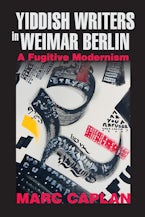- Home
- German Jewish Cultures
- Yiddish Writers in Weimar Berlin
Preparing your PDF for download...
There was a problem with your download, please contact the server administrator.
Yiddish Writers in Weimar Berlin
A Fugitive Modernism
by Marc Caplan
Published by: Indiana University Press
394 Pages
- eBook
- 9780253051974
- Published: January 2021
$39.99
Other Retailers:
In Yiddish Writers in Weimar Berlin, Marc Caplan explores the reciprocal encounter between Eastern European Jews and German culture in the days following World War I. By concentrating primarily on a small group of avant-garde Yiddish writers—Dovid Bergelson, Der Nister, and Moyshe Kulbak—working in Berlin during the Weimar Republic, Caplan examines how these writers became central to modernist aesthetics. By concentrating on the character of Yiddish literature produced in Weimar Germany, Caplan offers a new method of seeing how artistic creation is constructed and a new understanding of the political resonances that result from it.
Yiddish Writers in Weimar Berlin reveals how Yiddish literature participated in the culture of Weimar-era modernism, how active Yiddish writers were in the literary scene, and how German-speaking Jews read descriptions of Yiddish-speaking Jews to uncover the emotional complexity of what they managed to create even in the midst of their confusion and ambivalence in Germany.
Caplan's masterful narrative affords new insights into literary form, Jewish culture, and the philosophical and psychological motivations for aesthetic modernism.
Acknowledgments
Introduction: Weimar and Now
Spectral Empires: Landscapes, Nation-States, and the Homelessness of Weimar Modernism
1. A Past Become Space: Alfred Döblin and Dovid Bergelson in Poland, the Soviet Union—and Berlin
2. At the Crossroads of the Twentieth Century: Neue Sachlichkeit and Dovid Bergelson's Berlin Stories
Melancholic Conspiracies: Masks, Masques, and the Performance of Self in Yiddish and German Modernism
3. Watch the Throne: The Baroque, The Gothic, and Symbolism in Der Nister's Early Stories
4. Harold Lloyd and the Hermit: Popular Culture, Gothic Aesthetics, and the End of Der Nister's Symbolist Career
Apocalyptic Origins: The Politics of Nostalgia in German and Yiddish Modernism
5. Arrested Development: Fragmentation, Apocalypse, and the Pursuit of Origins in Joseph Roth's Representation of Eastern Europe
6. Moyshe Kulbak's Berlin Writings: Here, There, Everywhere (Nowhere)
Conclusion: Origin Is the Goal
Bibliography
Index
Marc Caplan is Visiting Professor in the Taube Department of Jewish Studies at the University of Wroclaw, Poland. He is author of How Strange the Change: Language, Temporality, and Narrative Form in Peripheral Modernisms.
"In this richly informed study, Marc Caplan gives voice to the radically cosmopolitan "Weimar Yiddishists." His brilliant juxtapositions both capture these writers' unique contribution to modernist aesthetics and illuminate the reciprocal encounter between Eastern European Jews and interwar German culture. The result is intellectual history as it should be written: lucid in style and capacious in breadth."
~Vivian Liska, author of German-Jewish Thought and Its Afterlife
"This original, insightful and thought-provoking book opens up a new avenue in comparative literature studies by engaging the leading Yiddish and German authors of the Weimar period in a multilayered conversation. Caplan navigates the diversity of literary voices with confidence and finesse, taking his lead expertly from the key European thinkers of the age. Yiddish Writers in Weimar Berlin will significantly enrich our understanding of European Jewish modernity and generate lively scholarly debate."
~Mikhail Krutikov, author of Der Nister's Soviet Years
"Marc Caplan offers us an entirely new vantage point from which to read a set of fascinating literary texts. Yiddish Writers in Weimar Berlin demonstrates why they matter and why it is useful to spend time with them under the guidance of an knowledgeable and playful reader like Caplan. Through Caplan's lens, the texts both illuminate their own historical moment and remind us that history continues to pulse through our present."
~Na'ama Rokem, author of Prosaic Conditions: Heinrich Heine and the Spaces of Zionist Literature
"Caplan's work is a sprawling, at times idiosyncratic,rich, and deeply earnest stu y of modernist aesthetics and the political, social, artistic, and lit rary contexts that inform them from the vantage points of center and periphery."
~Jessica Kirzane - The University of Chicago
"Yiddish Writers in Weimar Berlin is a remarkable work of critical imagination that stages a conversation between Yiddish and German modernism. In lively and often memorable prose, Caplan analyzes "the reciprocal encounter between Eastern European Jews and German culture, concentrating primarily on a small group of avant-garde Yiddish writers working in Berlin during the Weimar Republic, taken in comparison with corresponding figures working in German-language literature, critical theory, journalism, and film."
~Matthew Johnson, German Studies Review
"Yiddish Writers in Weimar Berlin offers a riveting analysis of the poetic and political force of Yiddish modernism, but it is also an invitation to look at Yiddish avant-garde beyond the confines of Jewish culture."
~Marc Volovici, In Geveb: A Journal of Yiddish Studies
"Caplan's analysis is most fascinating when it is able to illuminate points of tension or difference between German and yiddish-language gazes east that appear in literary depictions produced in Berlin in the 1920s and early 1930s."
~Emma Woelk, The German Quarterly

